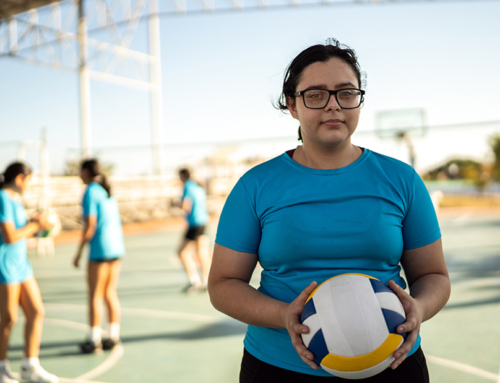Being a great or even a good coach takes more than just knowing the x’s and o’s of the sport, drawing up a few plays, and making line changes here and there. For a team or individual athlete to be successful, there is a need for motivation and encouragement from coaches, peers, and fans.
As a coach, it is essential to be familiar with how your team or player works and what makes them tick. For some, it is the fear of running lines. For others, it is the goal of achieving a scholarship. This only gets more complexed as the size of your team increases and as athletes get older. While going for ice cream can still work at any age, they may need more than a frozen treat in all reality as athletes get older. Here are some ideas that may help you motivate and encourage your athletes and your teams.
How To Motivate Your Athletes
1. Create The Environment
By developing and putting effort into maintaining an environment where athletes want to be, they will more than likely do just that, want to be there. Having a well-maintained playing surface (ice, gym floor, field, etc.) and modern equipment are just the start. Add in some perks like a sound system or locker room to help build positive feelings. The same can be said for the gear that they wear. If their uniform is dated and tattered, they more than likely will compete like old and worn-out players, but a crisp, clean uniform will make them want to represent the school or team proudly.
2. Do What I Do, Not Just What I Say
When athletes and teams see their coach doing the same drills or workouts, it shows them that you are equally as invested in the journey. Asking them to run up a hill as part of their training while you sit at the bottom drinking a nice cool beverage doesn’t show motivation or encouragement. Get out there with them and run the same hills and battle through the same drills. It does not matter whether you beat them or trail behind. What matters is that they see you grinding just as hard as you want them to be.
3. Be Available
Making yourself and other members of the coaching staff available for after practice or after game talks. Often as coaches, we spend more time with our athletes than their family and friends do and can be a great source of being an outlet to discuss things like school, family issues, and the current state of the world. As much as we want our athletes to focus on their sport, it is equally important to focus on them as people first.
4. Celebrate the Small Victories
Not everyone can make the game-winning basket, score the game-winning goal or make the game-winning save. Knowing that there were many moments before the final buzzer that led to the victory (or even the loss in a competitive game) is key to helping for future success. Getting excited about a player who hustles for a loose ball or strikes out the opponent’s best hitter in the middle innings will only go towards helping repeat actions.
With each major goal consisting of smaller goals, help your players realize that one comes from the other and that smaller goals are equally as important. Adding an extra five pounds or a couple of reps is huge, increasing shooting percentages and shaving some time off a sprint. No matter how big or small the achievement, acknowledgment of the feat goes a long way towards the next step.
5. Everyone Is Unique
Every athlete you work with as a coach or trainer will perform differently, react differently, and need to be motivated differently. This means that one size does not fit all when it comes to coaching and encouraging. Learning how each needs to be encouraged and inspired will help you when it comes time to give them that extra boost of confidence and support. For some, they react to a loud voice and yelling. Others cower into their shell. Some like to be acknowledged in front of their peers, whereas others feel uncomfortable in the spotlight. While some may respond to verbal encouragement, others prefer non-verbal feedback.
6. Team Building Activities
Most athletes enjoy forming positive relationships through their sport, be it with teammates or connecting with other individuals with the same interest. While they do not have to be the BFFs, it is just as important for athletes to spend time with each other away from the game/practice as it is during it.
As a coach who arranges activities such as a team dinner, an Escape Room, go-karting ora video games night, you will have the opportunity to learn more about the team away from the bench. It’s important to build bonds on and off the bench
7. Next Play Mentality
Rarely, an athlete has not made a mistake during a practice or game at any age. Turnovers, fumbles, missed gimmie shots, Even the best players in the world have experienced them. The thing is, there is ABSOLUTELY NOTHING that you or anyone can do about it unless you own a time machine. Dwelling on a mistake will just snowball into the next play, so focusing on what will happen, not what just happened. This goes for big plays as well. Spending time celebrating and focusing on a big play (in the middle of the game) can be just as negative as allowing a mistake to linger, as the opposing team is bound to respond and react. Moving on to the next play keeps athletes focused on the task at hand.
8. Top to Bottom
It does not matter whether it is your star player or one deep on the bench. They are all essential and should be treated equally as such. The star players will get their fair share of attention and the spotlight for what they do, but bench players often get forgotten and many do not realize how much work they put into helping make that star player better and turn the entire team.
Long-time San Antonio Spurs coach Gregg Popovich had no problem getting into the face of his top players like Tim Duncan or Tony Parker, just the same as he did a guy who was getting spot minutes. Treating all your players as equals helps to keep everyone on the same level playing field.
9. Great Job
Two words can go a long way. But sometimes, as coaches, we tend to get into the habit of quick response and catchphrase without really articulating why. Saying “great job,” “good work” is fine now and then but try taking it a step further and tell the player exactly why they did great or good. Why was it a great shot? Because they had perfect release and footwork. Why was it a great hit? Because they followed through and stepped into the pitch. Do not leave your players wondering why they were good or excellent. Tell them why.
10. I See You
The only way to get more playing time is to get the attention of your coach for doing something impressive or positive. When you notice a player putting in the extra work with additional reps or time in the weight room or hitting up an assistant coach to go through plays and details to certain movements, let them know that you see what they are doing. By allowing a player know that you notice the extra effort they are putting in to get better as an individual or as a team member, they will understand that all their efforts are worthwhile and will hopefully result in more playing time or responsibility.
11. Affirmations
Teaching players how to take a quick self out in the middle of a chaotic and intense moment to breathe and refocus on all their work to get them to where they are can play a vital role in the “next play” mentality. Phrases like “I’m going to hit this shot” or “I’m going to hit this pitch” can go a long way to helping create a positive outcome over time. Help your athletes work on creating a believable phrase. Saying to themselves that they will be a professional-level athlete is not exactly realistic in the moment and will not provide immediate feedback. But something such as “I’ve done this before” or “Don’t let up” is simple and effective with a short-term result.
12. Picture This
Imaginations are great. They allow us to picture anything and everything that we want. There are times in which coaches say to athletes, picture yourself doing “this.” However, a better option would be to show them pictures or videos of them in action, making the shot, lifting the weights, running fast, or hitting the ball. Additionally, you can also use pictures or videos of similar-aged athletes who have achieved success as inspiration. While showing them a picture of Lebron James, Sidney Crosby, Serena Williams, or Hope Solo can help them focus on their ultimate dream, seeing players their own age having success is more realistic to relate to.
With everything that is going on in the world today, it seems like now more than ever that our athletes (and people in general) need to hear honest feedback and positive reinforcement of successful actions and behaviors. While sugar-coating the truth does not help development in the long run, giving words of encouragement as well as having positive body language will go a long way into getting more out of your athlete and team.
Original Article Posted on stack.com



